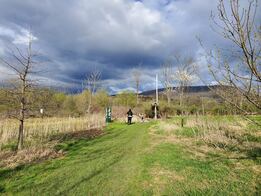
The ecological crises can be overwhelming. Climate change alone can seem insurmountable. And what can I do—one of 7.53 billion Homo sapiens? One idea I’ve heard recently in critical discourse is that climate change is a political, and not a personal, problem that requires political, and not personal, solutions. This type of opinion is usually given by a person who talks about climate change without mentioning other ecological crises (e.g., plastics, e-waste, species collapse, soil loss). This binary way of thinking is mistaken—doing personal work does not in any way preclude or hinder doing political work. Wendell Berry writes:
"If using less energy would be a good idea for the future, that is because it is a good idea. The government could enforce such a saving by rationing fuels, citing the many good reasons, as it did during World War II. If the government should do something so sensible, I would respect it much more than I do. But to wish for good sense from the government only displaces good sense into the future, where it is of no use to anybody and is soon overcome by prophesies of doom. On the contrary, so few as just one of us can save energy right now by self-control, careful thought, and remembering the lost virtue of frugality. Spending less, burning less, traveling less may be a relief."
If Berry is right, it seems obvious that people who are personally polluting might not be the best people to trust on solutions to the challenge. They've put off good sense to an imaginary future, where they can start living well now. Would you trust a mechanic who cannot keep h/is car running?
In my book I suggest both gardening and wilderness for understanding the ecological crises. Gardening involves placing your hands in soil, producing some part of your own food and beauty, and becoming a responsible steward of the place where you live—whether a house on a large lot or a window in an apartment. Gardening is a phenomenal praxis—it is seen, heard, smelled, tasted, and touched. It is the smallest sphere of our influence—our daily actions. Our habits. Gardening as a metaphor, might involve incorporating solar or wind energy in your house, or choosing to buy a more fuel efficient car, or driving for family vacations more often, and flying less often. Maybe it means walking or riding a bicycle to work. Perhaps we keep a bird feeder, or volunteer at a local park. We talk to our neighbors about what we can do here, now. Just as cultures are diverse, gardening practices are diverse—some people till, others do not; some follow Ruth Stout, or Masanobu Fukuoka; some plant pollinator gardens, and others food gardens. It’s also true that our gardening-as-metaphor choices are various. Some actions are always a good choice, but others are appropriate based on bioregion, or neighborhood, or soil-type. There are different cultural ways to live sustainably and regeneratively. Most of the world's cultures have been ecologically sustainable. Because our gardening praxes are ours, we know them intimately. Gardening, actual and metaphorical, increases our ecological consciousness—our awareness of many diverse ways our ecological place exists.
In contrast, wilderness areas emerge as political ideals and then as policy [Here's a photo I took of Millbrook Marsh, a great example of a local nature area that captures carbon, provides space for non-human animals, and recreation for humans]. When polities—a borough, or state, or nation—set a piece of land aside as wilderness, we necessarily limit our phenomenal experience of that place. Perhaps we limit recreational boats in an area where manatees are negatively impacted, or we protect a stretch of land used by a migratory cranes. Rather than phenomenal knowledge—and ecological consciousness—wilderness, as actual or metaphorical, depends on scientific knowledge and political effort. We have to be literate of ecological matters to make good political choices—to advocate for the right actions. Many of the solutions to climate change will obviously exacerbate other ecological crises, if we only take a few moments to reflect before acting.
I argue that, in schools and other pedagogical spaces, both are needed—that gardening and wilderness work together for eco-literate pedagogy. We provide phenomenal experiences with nature because these cultivate ecological consciousness. We can draw spiritual sustenance for activism from Mother Earth. We can learn, in a non-scientific way, about the non-human animals we share our place with. We can experience our bioregion. Scientific knowledge is also required if we’re going to conceptualize crises that are harder to experience, such as plastic waste in the oceans, climate change, or deforestation. We can expand our ecological consciousness through artistic and scientific conversations in place. To be ecologically literate means both personal and political action, as we transform unsustainable ways of living, including political and business practices, including dismantling unjust hierarchies in capitalism such as ableism (note the work FDR did to preserve parks and make them accessible), racism, sexism, and classism, and conserve regenerative cultural practices, including diverse farming, storytelling, and musicking.
As a final note, June 11th is a day when environmentalists and anarchists recognize imprisoned activists. You can learn more about people imprisoned at the Crimethinc blog.
DJS
 RSS Feed
RSS Feed
